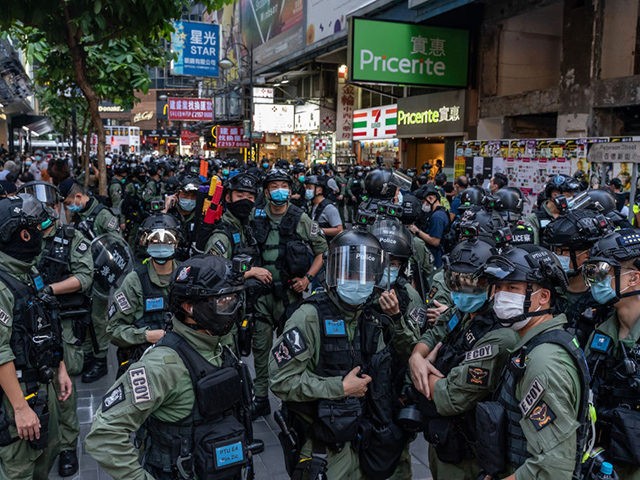Hong Kong police mobilized in force on Thursday, the 71st anniversary of the founding of the Communist Chinese regime, as hundreds of citizens defied a ban on unauthorized public gatherings to demonstrate in favor of democracy.
The Hong Kong Free Press (HKFP) described a few choice scenes from the demonstrations:
There was a heavy police presence in Causeway Bay outside of the SOGO shopping center from the early afternoon, as officers stopped and searched members of the public. Several journalists, including a reporter for local media outlet the PSHK, were also questioned.
At around 1 pm, police raised a blue flag twice in the space of a few minutes, warning those present that they were participating in an unauthorized assembly and were in breach of the law.
A black-clad man carrying a large yellow balloon was stopped by police, as officers warned him his “behavior” may “hurt passers-by.”
The protesters taunted Hong Kong’s Communist-dominated government by chanting “Liberate Hong Kong, Revolution Of Our Times,” the famed slogan that was criminalized as seditious under the national-security law imposed by Beijing at the end of June. Police responded by hoisting the purple banner that warns of possible arrest and prosecution for violating the totalitarian security law.
Another widespread technique for needling the police was to ostentatiously read copies of Apple Daily in front of them. The founder of Apple Daily, pro-democracy media tycoon Jimmy Lai, has been brought up on charges viewed by pro-democracy activists as an effort to silence him. Buying copies of Apple Daily, and purchasing classified ads in the paper, is now a popular means of protest. The classified pages of the newspaper now bear a distinct resemblance to a Lennon Wall, the walls covered with protest messages written on colorful Post-It notes that became a symbol of resistance in 2019.
The protesters said they still insist upon the “five demands” promulgated when the movement began last year. They have a new cause as well: freedom for 12 Hong Kongers captured at sea while reportedly fleeing to Taiwan. The twelve have been classified as “elements attempting to separate Hong Kong from China” by the Chinese government and are being detained in the city of Shenzhen. The U.S. government, along with international human rights groups, have denounced the detentions.
The Hong Kong police reported at least 86 arrests for “participating in unauthorized assemblies, possession of offensive weapons, and other offenses.” There were also reports of people cited for violating coronavirus social distancing rules. Pro-democracy activist Lee Cheuk-yan pointedly tore up the citation he was issued for breaking social distancing roles.
The HKFP noticed that no police responded at all to an apparently unlicensed procession of red-clad loyalists marching with Chinese flags early Wednesday morning.
Hong Kong chief executive Carrie Lam praised the national security law in her remarks at a commemoration of the People’s Republic of China founding on Thursday, as reported by China’s state-run Xinhua news service:
After experiencing social unrest last year and the implementation of the national security law in Hong Kong in late June, it has been clear that to ensure continued progress in various causes, Hong Kong must maintain a safe and stable environment, adhere to the “one country” to safeguard national sovereignty and security, correctly understand the relationship between the “one country” and the “two systems,” and act in accordance with the Constitution and the Basic Law of the HKSAR [Hong Kong Special Administrative Region], Lam said.
Over the past three months, stability has returned to the Hong Kong society, national security has been safeguarded in the HKSAR, and people are able to enjoy their basic rights and freedoms in accordance with law, she said.
Lam said the HKSAR government will more actively push Hong Kong to integrate into the national development and called on Hong Kong people to genuinely uphold the “one country, two systems” principle and the Basic Law of the HKSAR and make concerted efforts to build Hong Kong into a better place.
One of the medals traditionally handed out on National Day went to Stephen Lo — the former police commissioner who the U.S. government sanctioned, along with Lam and several other top officials, in August for “undermining Hong Kong’s autonomy and restricting the freedom of expression or assembly.”
The record-breaking number of honors handed out to Lo and other police officials this year were interpreted as the Hong Kong government’s definitive rejection of the Five Demands, one of which involved holding the police accountable for abusing protesters.
The Washington Post reported thousands of police were able to effectively “throttle” the protests on China’s “National Day,” demonstrating “the near impossibility of staging the massive street demonstrations that have been a part of Hong Kong’s unique civic life for years.”
The Post described a melancholy vignette that summed up the sad state of liberty on the once-autonomous island: “At one point, a battery-operated speaker left on the sidewalk started playing ‘Glory to Hong Kong,’ the unofficial protest anthem. People began cheering and clapping before officers rushed to the scene, kicked it over and turned it off.”

COMMENTS
Please let us know if you're having issues with commenting.